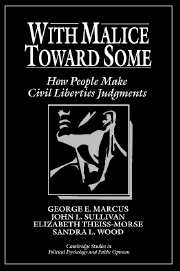Book contents
- Frontmatter
- Contents
- List of Figures and Tables
- Preface: Political Tolerance and Democratic Life
- PART I Theoretical Background and Overview
- PART II Contemporary Information and Political Tolerance Judgments
- PART III Refining the Model – The Role of Antecedent Considerations as Individual Differences
- PART IV Implications and Conclusions
- 9 Intensity, Motivations, and Behavioral Intentions
- 10 Human Nature and Political Tolerance
- Appendix A: Hypothetical Group Scenarios and Manipulations
- Appendix B: Methodological Approaches and Scales
- Notes
- References
- Index
10 - Human Nature and Political Tolerance
Published online by Cambridge University Press: 05 August 2012
- Frontmatter
- Contents
- List of Figures and Tables
- Preface: Political Tolerance and Democratic Life
- PART I Theoretical Background and Overview
- PART II Contemporary Information and Political Tolerance Judgments
- PART III Refining the Model – The Role of Antecedent Considerations as Individual Differences
- PART IV Implications and Conclusions
- 9 Intensity, Motivations, and Behavioral Intentions
- 10 Human Nature and Political Tolerance
- Appendix A: Hypothetical Group Scenarios and Manipulations
- Appendix B: Methodological Approaches and Scales
- Notes
- References
- Index
Summary
The … Passions of man, are in themselves no Sin. No more are the Actions, that proceed from those Passions, till they know a Law that forbids them …
Hobbes, The LeviathanWe attempt throughout this book to answer an important question: how do people go about the task of making tolerance judgments? Because democratic societies can, and often do, extend considerable responsibilities to citizens, the answer to this question is fundamental to strengthening political society so that diverse and often antagonistic political interests can contend while secure in the enduring support for the civil rights of all. Democratic theorists endorse the importance of public debate, deliberation, and being well-informed. If citizens rely fully on antecedent considerations, then democracy may stagnate. If citizens also attend to contemporary circumstances, then they are better equipped to participate in all of the political choices that democracy affords. Not only can citizens recognize and perpetuate the values of their society, they can adapt these principles to new circumstances.
If we could better understand how people make political judgments, we could enter into the debate about citizen competency with a more substantial basis for assessment and consideration (Marcus & Hanson, 1993; Thompson, 1970). How people make political tolerance judgments may provide considerable insight about how they make other political choices. Certainly, the choices citizens make in the realm of political tolerance are considerably more demanding than other, less complex, political choices.
- Type
- Chapter
- Information
- With Malice toward SomeHow People Make Civil Liberties Judgments, pp. 209 - 228Publisher: Cambridge University PressPrint publication year: 1995

